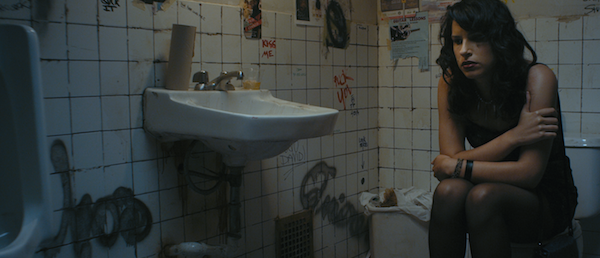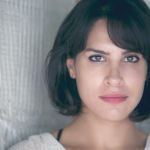“I’m tired of playing that sad fiddle.”—Appropriate Behavior Director Desiree Akhavan

I interviewed Desiree Akhavan, writer-director of Appropriate Behavior, after the film world premiered at the 2014 Sundance Film Festival. The winner of the Grand Jury Prize for Screenwriting at Outfest, Appropriate Behavior opened theatrically in LA and NY and on VOD on January 16, 2015, and is up for a Film Independent Spirit Award for Best First Screenplay.
Roya Rastegar: I am a total fan of The Slope. How did you approach your film differently from your webseries?
Desiree Akhavan: I started writing Appropriate Behavior while I was doing The Slope. The Slope is a heightened, Portlandia-esque world with all the silliest things that I would ever think of and never say out loud. With Appropriate Behavior, we tried to keep the world grounded, like you’re a fly on the wall in a real situation. I love a good, deadpan joke, but I also wanted the film to have scope, to deal with what it’s like to have your heart broken and come out to an Iranian family. I wanted to show her world as a whole.
RR: How close is Shirin, the lead character in Appropriate Behavior, to you?
DA: Close enough that I didn’t feel comfortable casting another actress and being like: “Do an impression of me!” She’s a heightened version of my best and worst qualities, where I was in my life at 25. I wanted to poke fun at my immaturity, but still be realistic. I didn’t want a caricature, though, I would never walk down the street with a dildo in my hand like Shirin. Like, I’m not that baller! [Laughs]
RR: Your film is so refreshingly inappropriate and different from other films I’ve seen about Iranians. What do you think the response will be?
DA: I think Persians are excited to have a different kind of representation. I mean, I love all Persian films, they are art-house and very beautiful. But some of it just doesn’t speak to me. I’m tired of playing that sad fiddle and hearing another terrifyingly sad victimizing story about Iranians. Same situation with lesbian films. I thought it was time to be a little tongue-in-cheek about it all—but hopefully respectful of where I come from. That’s why I loved A Girl Walks Home Alone At Night (directed by Ana Lily Amirpour). The excitement I felt watching that film! It’s so poetic, taking on these archetypes and throwing everything on its head. After so many years and so many dramatic films about struggle, we’ve earned this right by now to show what other badass shit we can do.
RR: How awesome to have both Ana Lily Amirpour’s film and your film at Sundance 2014? Talk about the emergence of a different generation of Iranian-Americans! Do you think being Persian has influenced the kinds of stories you tell and the way you tell them?
DA: My Iranian-ness affects my personality, my values are shaped by my family, and my sense of humor is shaped by experiencing life as me. Having to come out gives me a sensitivity, but also, growing up ugly–like, I was a really ugly kid and I had no friends. That gave me a similar kind of awareness and affected my sense of humor. I also watched a lot of TV growing up, like Full House and Brady Bunch, so I am also really an American at heart. But sometimes I feel like people just see me as a CNN headline. People have actually asked me: “Ooo! What’s it like being Persian?” I’m like, “I don’t know, what it’s like having two legs?”
RR: How did it feel taking that big step into directing your first feature film? Were you nervous?
DA: You never know what you’re getting yourself into with your first feature, especially when you’re starring in it. I remember, in one scene I was walking down the street by the Gowanus Canal with a strap-on, and a bunch of truck drivers arrived the minute we got on location—clearly religious with yamakas on—and they were very offended. They accused us of making pornography. We had to shoot it so fast, jump and run out of there quickly. During one take they literally booed at me, I was so embarrassed. It was really scary. But you know what, that was the first day of shooting, and it’s just super intimidating. The subject matter is all so personal and could be considered self-indulgent, whiny and stupid. But after that, I just decided I need to own this 110% no matter how stupid I feel or look. There’s a reason I said I was gonna do this, and I’m not gonna have any shame. And after that it was a really smooth shoot. I never looked back, I never second guessed any of the things.
 RR: Do you write and direct specifically so you can act?
RR: Do you write and direct specifically so you can act?
DA: I love directing and would not feel shafted not acting in my own film. Woody Allen didn’t act in all of his films—not that I’m saying I’m Woody Allen. I want to build a body of work I can go in and out of. I’m more of a storyteller than a performer, but I do still have to feed that performer need in me.
RR: Do you prefer a particular medium to tell stories in?
DA: I think you can jump back and forth right now. A lot of filmmakers coming of age don’t have that taboo reaction to web content or television. It’s about telling the story wherever it’s best served. I just want to keep generating content. I have a lot of ideas and stories to tell. I also want lots of people to watch my work, but I don’t know about how practical that is because work that’s a bit naughty, edgy, or gritty from a marginalized, underrepresented peoples tend to be set aside into a niche. And I just don’t see myself, or my work, that way.
RR: Who inspires your comedic and visual sensibilities? Who do you want to work with in the future?
DA: Such a long list. Sarah Paley. Julie Delpy. Louis C.K. is a genius. I obsess over Amy Poehler and Tina Fey’s work. I’ve actually written a role with Maya Rudolph in my mind. I love her in Away We Go. It’s a dramatic role, and she’s phenomenal. Also, Melanie Lynskey—I like women who have a very keen sense of humor, but also have a dramatic depth to their performances.
RR: What are you working on now, and what is it about comedy that compels you?
DA: I’m in pre-production for an animated web series called the Origin of Shame for Sony’s site, Astronauts Wanted. It’s a collection of true, traumatic memories from my experience attending this elite, private high school in New York City. I’ve also written another feature film script that is an Election-esque high school comedy. Comedy is how I process through rage at just everyday bullshit. Yesterday someone was trying to use the scene in the film to prove that bisexuals like threesomes because they like the best of both worlds. But that’s insinuating that sexuality is just your genitals, and we don’t enter into relationships with people based on who they are as humans. Those kinds of assumptions–about my sexuality, my heritage, my appearance, fill me full of rage. And that’s what comedy is for and why I love telling stories! [Laughs]
Roya Rastegar / Associate Director, Programming & Curated Content
